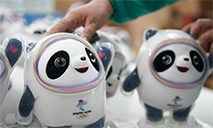Profile: From "Ice Prince" to "Ice Warrior," Hanyu determined to rise after fall
BEIJING, Feb. 10 (Xinhua) -- He came. He fell. He conquered.
Yuzuru Hanyu, dubbed the "Ice Prince," has made himself a warrior in what might well be his finale at the Olympics on Thursday, albeit an imperfect one.
Skating to Japanese music Heaven and Earth, the two-time Olympic figure skating champion knew shortly after the start of the free skate program that he would miss out on the podium, as he fell to land the fabled quadruple Axel, a gravity-defying jump that he called "the biggest reason for coming to Beijing."
The 27-year-old Japanese continued skating after, but then lost his balance one more time while attempting a second jump, a quadruple Salchow, as the audience at the Capital Indoor Stadium let out a unanimous sigh of pity.
However, Hanyu shrugged off the flaw and nailed the rest of the program with a stern resolve in his eyes.
Holding both his arms high and staring up to the sky for a while, Hanyu took a moment to digest his feelings before bowing to the appreciative audience amid thundering applause and cheers.
He then bended down to touch the ice, whispering "thanks" before leaving the rink.
"I honestly left everything out there. I have nothing left to give," a tearful Hanyu said at the mixed zone.
The scarred routine earned him 188.06 points, far lower than his best personal record of 223.20 points in the free skate.
Two days ago, in a stunning turn of the short program event, Hanyu singled his opening quad Salchow for a less-than-stellar 95.15 points, placing eighth overall.
The defending champion ended his Olympic journey by being ranked fourth with a total score of 283.21 points. His teammates Yuma Kagiyama and Shoma Uno claimed the silver and bronze medals, and American skater Nathan Chen clinched his first Olympic gold with a staggering 332.60 points.
"The result is disappointing of course, but I think I went all in," he said. "It wasn't easy. A lot goes through my mind when I think about what I tried."
WHY 4A?
Hanyu's persistent pursuit of the quadruple Axel, or "4A" came after a series of injuries that almost cost his career.
He did not compete internationally this season after suffering an ankle ligament injury and another leg injury to the same foot, but came back strongly to claim his sixth national title in December.
He skipped the team event starting on February 4 and the opening ceremony that same day, in an apparent bid to focus on the individual event.
Instead of playing a safe card to secure a medal, Hanyu repeated that his "quest" in Beijing is to realize his childhood dream of successfully performing the "4A."
The jump, which requires him to spin four-and-a-half times in mid-air before landing on one foot, has never been completed cleanly by anyone in formal competitions before, let alone at the Olympics.
Hanyu had given it the closest go during the Japanese national championship in December. However, it was downgraded due to his two-footed landing.
"I did the 4A much better this time, but I failed to realize my dream of completing it in this Olympics," he said. "I have worked really hard for it. I had the feeling of 'I almost did it,' but that's probably all I can do."
To present a perfect show of his own, Hanyu has prepared himself whole-heartedly for the 2022 Games from being involved in the design of his embroidered competition suit to choosing the music, in addition to tremendous efforts of training.
Using traditional Japanese instruments Koto, a plucked half-tube zither instrument, and Biwa, a short-necked wooden lute, the music Heaven and Earth features a story of a historical Japanese wartime soldier.
"Today's performance reflects the title of my music," said Hanyu. "I fell on the Axel, fell on the Salchow. but completed everything in the second half. It's about falling and getting back up again. It is these two mistakes that made the story (of 'Heaven and Earth' ) more meaningful."
On Chinese twitter-like platform Weibo, a comment on Hanyu's "4A" that has received over 120,000 thumbs-up speaks for many -- "Today, he is not aiming to win the gold medal, but to be a pioneer fighting endlessly."
WINNER FOR MANY
Born in Sendai, Japan, Hanyu began skating at the tender age of four. His parents gave his name "Yuzuru" which literally means a stretched bowstring in the hope their son will be resilient and composed against the ups and downs in life.
He was crowned the Olympic champion in Sochi in 2014 and then defended his title at PyeongChang 2018. With a perfect combination of skill, strength and elegance, he earned his nickname "Ice Prince."
His devotions and persistence have won him respect from peers as well as skating fans around the world.
Fellow Japanese Shoma Uno, who has been in the shadows of Hanyu's long-spanning career, commended his compatriot for enduring the pressure of fame and scrutiny.
"'Yuzu' is truly a priceless presence," said Uno, the bronze medalist. "He carries a weight that none of us can, and overcomes that pressure every single day."
In China, his modesty, determination and diligence have made him one of the most popular Olympians at Beijing 2022. Many who had never watched skating before fell in love with this sport because of him, regardless of his success and nationality.
"When he performed today, you just can't take your eyes off him," a fan Liu Ling from the city of Nanjing told Xinhua.
"He rose up from the falls, with such a stern and determined look on his face. He dominated the rink like a real warrior, a king."
On Weibo, Hanyu's hashtag has drawn more than 5.4 billion reads so far, with nearly five million comments. His selfie with the Olympic mascot - giant panda Bing Dwen Dwen has become an instant hit with more than 30,000 likes in two hours with many saying they want to send him a "Dwen Dwen" as a gift.
"The courage to make breakthroughs is more precious than any medal," a follower named "Glommy" wrote.
"He showed us the courage of a great athlete, using his actions to elaborate the Olympic spirit of faster, higher, stronger and together," another follower wrote. "These sports, especially skating, know no boundaries."
Photos
Related Stories
- China loses to world champion Switzerland in Olympic women's team curling
- China loses to U.S. in Olympic men's ice hockey debut
- Children make Bing Dwen Dwen with colored clay in Shanghai
- U.S. wins maiden freestyle skiing mixed team aerials gold at Beijing 2022
- Roundup: U.S. bags 3 golds while Japanese star Hanyu fall on quad Axel attempt at Beijing 2022
Copyright © 2022 People's Daily Online. All Rights Reserved.










